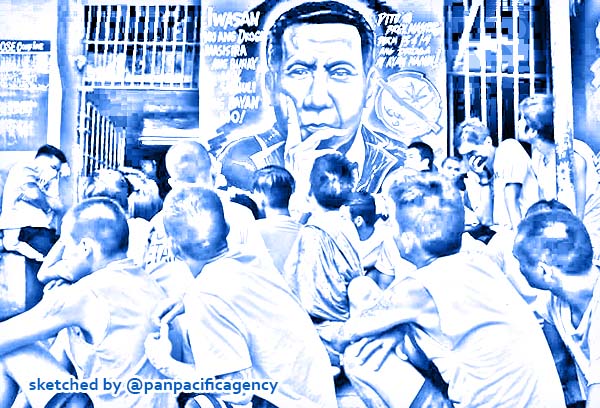[Analytics] Uphill battle for the Philippines new drug czar

Detainees sit next to a mural of Philippine President Rodrigo Duterte while authorities search through belongings for illegal contraband inside the Manila City Jail in metro Manila in 2017. The words on the mural read "Steer away from illegal drugs to save your life and in turn, will save the country's." | REUTERS. Sketched by the Pan Pacific Agency.
One of Philippines’ President Rodrigo Duterte’s fiercest critics, Vice President Leni Robredo has frequently challenged the president on his crackdown on drugs. Jason Thomas specially for The ASEAN Post.
Now dared to do a better job as the co-chair of the Inter-Agency Committee on Anti-Illegal Drugs (ICAD), the Philippines’ new drug czar has promised a “rational, evidence-based approach” in a bid to end the thousands of extrajudicial killings and abusive police practices that have seen the country’s war on drugs gain international notoriety.
While the Philippine National Police said in July that the three-year war on drugs has claimed around 5,500 lives, Human Rights Watch last year said the figure was closer to 12,000 – and seeking greater transparency and accountability for these murders and other abuses will be one of the former human rights lawyer’s most pressing tasks.
“Many have expressed concerns that this is an insincere offer, that it’s a trap which only aims to undermine and put me to shame,” said Robredo when accepting Duterte’s assignment on Thursday.
“While it can be said that this offer is just politicking and that the agencies won’t really follow me and would do everything so I won’t succeed, I’m ready to endure all of these.
“If I can save even one innocent life, my principles and my heart tell me that I should try.”
Different approach
Since Duterte took power in 2016, he has presided over a vendetta against drugs which has been widely criticised by human-rights groups who claim that police and state-sanctioned death squads are using excessive violence and executing suspects on the streets.
Duterte’s decision to name Robredo – who was elected separately to Duterte and is from a different party – was spurred in part by a 23 October interview with Reuters in which she pointed out that the drug crackdown had disproportionately targeted the poor and that police were abusing their power.
Calling for a different approach, Robredo noted that despite Duterte’s numerous threats to drug syndicates, there was no significant evidence of a decline in the supply or use of drugs – and the war on drugs was “obviously not working”.
While Robredo knows that a fresh approach is in order, this approach has to be based on science – and science is increasingly realising that drug addicts should no longer be viewed as criminals who must be punished but as patients in need of treatment and rehabilitation.
In an interview with Filipino media this week, Senator Risa Hontiveros said that Robredo should adopt a public health approach to combat drug use in the country.
“Drugs addiction is a mental health problem. We need a public health approach with rules-based laws enforcement and judicial reform as supporting actors,” said Hontiveros, a veteran health and women’s rights advocate in the Philippines.
The consequences of the traditional criminal justice responses to drug use has been clearly documented, and it results in stigmatisation, loss of employment and a breakdown in relationships.
Directing drug users to treatment centres instead of locking them behind bars will lower criminal justice costs and reduce social ills that may arise from having a family member behind bars – or worse.
Proper support
To effectively implement any policies, though, Robredo will need the full support of the 42 agencies under the ICAD – which is chaired by the Philippine Drug Enforcement Agency (PDEA).
Already, PDEA Director General Aaron Aquino, who co-chairs ICAD with Robredo, has said the inexperienced Vice-President will “fail” in her task and that he is “somehow awkward to have the second highest elected official of the country as my co-chairman in ICAD.”
While presidential spokesman Salvador Panelo said Duterte has directed all agencies to support Robredo, the president has some problems of his own to worry about.
In March, Duterte officially withdrew the Philippines’ membership from the International Criminal Court (ICC) after an inquiry into allegations of crimes against humanity committed by the president in his anti-drug battle.
In July, the United Nations (UN) Human Rights Council passed a resolution to investigate the alleged crimes committed during Duterte’s war on drugs – with a focus on reports of extrajudicial killings, arbitrary arrests and enforced disappearances.
“Her (Robredo’s) appointment does not change the fact that the Duterte administration’s war on drugs amounts to crimes against humanity,” said Nicholas Bequelin, Amnesty’s Regional Director for East and Southeast Asia.
“Just last month, Duterte told a police official to ‘go and kill everybody.’
“If this incitement to kill from the very top doesn’t end, the killings and other human rights violations won’t end either.”